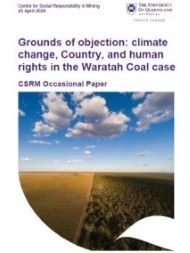Grounds of objection: climate change, Country, and human rights in the Waratah Coal case
This paper examines the landmark decision of the Land Court of Queensland delivered on 25 November 2022 in Brisbane to recommend the refusal of Waratah Coal Pty Ltd’s applications to develop a new coal mine in the Galilee Basin.
Lawyers reporting on the case say it has ‘captivated environmental organisations and lawyers, mining companies and members of the general public, with many grappling to understand and prepare for the implications and consequences of this decision’.
Headlining the interest in the case are several firsts:
- the first major coal mine refused in Queensland following a recommendation by the Land Court
- the first time a court in Queensland has factored-in the effect on the environment from burning the coal produced by a coal mine
- the first time in an Australian court decision that the deleterious effects of climate change have been accepted as impacting human rights, especially First Nations cultural rights
- the first time First Nations’ evidence in a mining objection in Queensland was heard ‘on Country’.
Although this paper reports on key aspects of the Land Court decision, it is not a legal take on proceedings. Rather, it is a social science-driven study concerned with how the Court has responded to Indigenous peoples’ arguments for protecting their cultural interests in response to proposals for large-scale thermal coal mining in Queensland. The purpose is to expound on specific dimensions of the case and make the legal issues accessible to an interested non-legal audience. Of particular interest is how the reasons connect environmental protection with protection of the cultural rights of First Nations people.
Language: English
Publisher: Centre for Social Responsibility in Mining
Region: Australia
Type: Occasional Paper
CITATION
Barnes, R. (2024) ‘Grounds of objection: climate change, Country, and human rights in the Waratah Coal case’. Occasional Paper, Centre for Social Responsibility in Mining, The University of Queensland: Brisbane, Australia.

